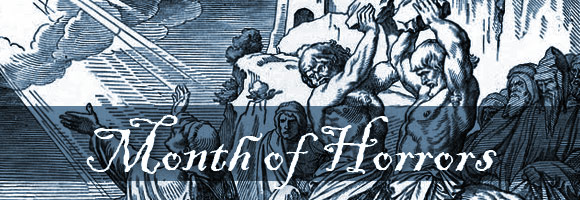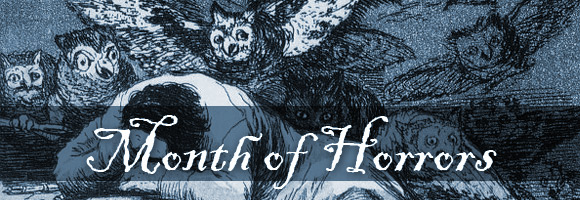Philip K. Dickathon: The Cosmic Puppets
Guest Blogger and WWEnd Member, Charles Dee Mitchell, has contributed a great many book reviews to WWEnd and we’ve invited him to contribute to our blog. This is the latest in Dee’s series of Philip K. Dick reviews that he started on his blog www.potatoweather.blogspot.com. We’ll be posting one every week until he runs out of reviews or gets tired of Philip K. Dick books.
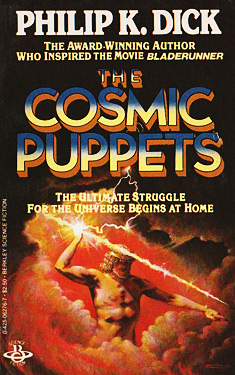 If written today, The Cosmic Puppets could have been Philip K. Dick‘s foray into YA fantasy fiction. He would have needed to change the protagonist into a plucky teenager instead of a full-grown man, but other than that all the elements are in place.
If written today, The Cosmic Puppets could have been Philip K. Dick‘s foray into YA fantasy fiction. He would have needed to change the protagonist into a plucky teenager instead of a full-grown man, but other than that all the elements are in place.
On a road trip to Florida with his almost estranged wife, Ted Barton wants to stop off at Millgate, the Virginian town he left as a young man eighteen years before. They find the town, but everything about it has changed. (Cue the Twilight Zone theme music here.) Street names, buildings, people, everything is different and slightly decrepit. Then Ted finds his name in an old newspaper, a victim of scarlet fever in 1935.
The Cosmic Puppets is pure fantasy — no science fiction involved. There are two children, Peter who makes tiny clay golems to report of Ted’s movements, and Mary who gets regular reports from moths and bees on Peter’s activities. Mary and Peter do not get along. Peter reveals to Ted the enormous beings who make up the valley’s mountainsides and whose heads reach into the heavens. Little Millgate, Virginia, has become the host of an epic battle between the forces of good and evil. (Just their bum luck.) Ted and the town drunk who somehow escaped "the change" have to will the real Millgate back into existence.
There are some creepy elements here, mostly dependent upon how you feel about spiders and rats. But the Twilight Zone theme continues to hum along in the background, and Rod Serling could make an appearance at any moment.
Month of Horrors: The Turn of the Screw
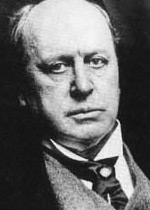 Science Fiction and Fantasy have done a little genre merging of late. Our tech has become a little more fantastic and our magic more technical. Steampunk has crossed over into the mainstream of fandom, kindling a new interest in the 19th century, in particular. Steampunk may be new, but it’s also old. In those heady days of the late 1800s, science fiction was in its infancy, and fantasy wasn’t selling. The hot genre was the ghost story — one of the founding fathers of modern horror.
Science Fiction and Fantasy have done a little genre merging of late. Our tech has become a little more fantastic and our magic more technical. Steampunk has crossed over into the mainstream of fandom, kindling a new interest in the 19th century, in particular. Steampunk may be new, but it’s also old. In those heady days of the late 1800s, science fiction was in its infancy, and fantasy wasn’t selling. The hot genre was the ghost story — one of the founding fathers of modern horror.
One of the great ghost stories is Henry James‘ classic, The Turn of the Screw. Published in 1898, just before the turn the of the century, James’ novel tapped into the freewheeling scientific inquiry of the time. The notion of "spiritual phenomena" was considered scientific and quite legitimate. Many intellectuals of the day professed a belief in ghosts, and séances were all the rage. Yet James approached his ghosts in a way that was as mysterious as the apparitions themselves. The ghosts in The Turn of the Screw are only ever witnessed by one character, and the veracity of her narration is sometimes in doubt. The brother of William James (a famous psychologist), Henry was the first to psychologize the notion of ghosts. The reader is free to suppose the shadowy figures as the delusion of an insane nanny, yet not comfortably. The ghosts themselves never seem to really interact with the world, but, instead, beckon their victims to harm themselves, again leaving room for interpretation. This is, perhaps, why the novella has survived as well as it has (certainly longer than the "science" of spiritualism) — because the ghosts live only in the corner of the reader’s eye. Examine a phenomenon like this too closely, and it vanishes.
 The story is the first in a long line of psychological thrillers that have you doubting what you are seeing. Although it isn’t the first of the ghost story genre (Homer, Shakespeare, Dickens all came before), it is possibly the most copied in modern storytelling. After reading The Turn of the Screw, you’ll see subtle homages (intended or unintended) in films like Inception, where the unreliable nature of the human mind is writ large. Life on Mars also comes to mind: "Am I mad, in a coma, or back in time!" The novella even appeared several times in the series Lost, as a clue to eery happenings to come (even after the finale, many Losties were left wondering what was real).
The story is the first in a long line of psychological thrillers that have you doubting what you are seeing. Although it isn’t the first of the ghost story genre (Homer, Shakespeare, Dickens all came before), it is possibly the most copied in modern storytelling. After reading The Turn of the Screw, you’ll see subtle homages (intended or unintended) in films like Inception, where the unreliable nature of the human mind is writ large. Life on Mars also comes to mind: "Am I mad, in a coma, or back in time!" The novella even appeared several times in the series Lost, as a clue to eery happenings to come (even after the finale, many Losties were left wondering what was real).
Horror, at its best, tortures not just its characters, but its audience. If you decide to read this one, be prepared to have the screws turned on you.
The Bram Stoker Award
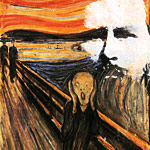 As part of WWEnd’s Month of Horrors, we have added the first book award to the site in years: The Bram Stoker Award. This Horror-related award was formed in 1987 by the Horror Writer’s Association. Here’s how the HWA describes the award:
As part of WWEnd’s Month of Horrors, we have added the first book award to the site in years: The Bram Stoker Award. This Horror-related award was formed in 1987 by the Horror Writer’s Association. Here’s how the HWA describes the award:
Each year, the Horror Writer’s Association presents the Bram Stoker Awards for Superior Achievement, named in honor of Bram Stoker, author of the seminal horror work, Dracula…. To ameliorate the competitive nature of any award system, the Bram Stoker Awards are given “for superior achievement,” not for “best of the year,” and the rules are deliberately designed to make ties possible. The first awards were presented in 1988 (for works published in 1987) and they have been presented every year since. The award itself is an eight-inch replica of a fanciful haunted house, designed specifically for HWA by sculptor Steven Kirk. The door of the house opens to reveal a brass plaque engraved with the name of the winning work and its author.
The addition of the Stoker has brought with it such famed authors as Alice Sebold, Stewart O’Nan and Joyce Carol Oates—adding Dante Alighieri to the site was just for fun, really—so check it out and see what strikes your fancy… or strikes terror in your heart.
The Avengers Theatrical Trailer!
This looks like it’s going to be fun! I have no idea who the bad guy is supposed to be but the good guys look right… especially Black Widow. As expected, Tony Stark appears to be getting all the best lines. What do you think of this trailer?
Month of Horrors: The Metamorphosis
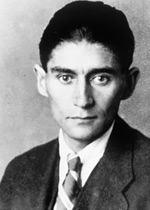 Franz Kafka’s novella The Metamorphosis exists in the same terrifyingly absurd sort of world as so many of his other stories. His characters are often oppressed by isolation and a sense of futility, and as such the horror they experience is part and parcel with the very act of living. In his novel The Trial, for instance, Josef K. is arrested and prosecuted for a crime unknown not only to the reader but to himself. Many of Kafka’s stories exist on the borders of madness and despair, something most Horror writers can only dream of accomplishing in their own work.
Franz Kafka’s novella The Metamorphosis exists in the same terrifyingly absurd sort of world as so many of his other stories. His characters are often oppressed by isolation and a sense of futility, and as such the horror they experience is part and parcel with the very act of living. In his novel The Trial, for instance, Josef K. is arrested and prosecuted for a crime unknown not only to the reader but to himself. Many of Kafka’s stories exist on the borders of madness and despair, something most Horror writers can only dream of accomplishing in their own work.
The Metamorphosis is a strangely-layered work pulling out of many literary traditions, but still seemingly unique. The title, for instance, is a reference to Ovid’s Metamorphoses, an ancient Roman work that retells Greek myths to make the philosophical point that all things are in a state of flux and transformation. The mutation of traveling salesman Gregor Samsa into a giant insect is reminiscent of werewolf stories… well, except for the insect part. The suddenness and unexplained nature of the mutation is a feature of absurdist and postmodern art, which has it that the world (contra Aristotle) is intrinsically irrational and chaotic. The unkindness of Gregor’s family as they fail to adjust to his curse is evocative even of the crueler sort of European fairy tales.
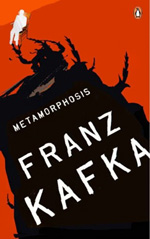 But despite all this, there is nothing that can quite prepare the reader for a story which describes the protagonist’s plight in this way: “His numerous legs, which were pitifully thin compared to the rest of his bulk, waved helplessly before his eyes.” It manages to be both disgusting and terrifying at the same time, something the Splatterpunk subgenre rarely achieves. Gregor’s attempts to move and talk in his new, inhuman body are pitiful, making one want to weep and vomit simultaneously. His family is uncertain whether this giant insect is still their son, though because of our privileged point of view, we know that he is. Only after his father has crippled him do they allow him to venture out of his room now and then. I won’t ruin the ending, but you wouldn’t be wrong to guess that it’s not a happy one.
But despite all this, there is nothing that can quite prepare the reader for a story which describes the protagonist’s plight in this way: “His numerous legs, which were pitifully thin compared to the rest of his bulk, waved helplessly before his eyes.” It manages to be both disgusting and terrifying at the same time, something the Splatterpunk subgenre rarely achieves. Gregor’s attempts to move and talk in his new, inhuman body are pitiful, making one want to weep and vomit simultaneously. His family is uncertain whether this giant insect is still their son, though because of our privileged point of view, we know that he is. Only after his father has crippled him do they allow him to venture out of his room now and then. I won’t ruin the ending, but you wouldn’t be wrong to guess that it’s not a happy one.
I’ll close with a brief passage, one which is fairly typical of Kafka’s writing. Good luck eating dinner afterwards!
Then he set himself to turning the key in the lock with his mouth. It seemed, unhappily, that he hadn’t really any teeth—what could he grip the key with?—but on the other hand his jaws were certainly very strong; with their help he did manage to set the key in motion, heedless of the fact that he was undoubtedly damaging them somewhere, since a brown fluid issued from his mouth, flowed over the key, and dripped on the floor.
(Translations by Willa and Edwin Muir)
Philip K. Dickathon: Vulcan’s Hammer
Guest Blogger and WWEnd Member, Charles Dee Mitchell, has contributed a great many book reviews to WWEnd and we’ve invited him to contribute to our blog. This is the latest in Dee’s series of Philip K. Dick reviews that he started on his blog www.potatoweather.blogspot.com. We’ll be posting one every week until he runs out of reviews or gets tired of Philip K. Dick books.
 Even Lawrence Sutin, PKD’s biographer, refers to Vulcan’s Hammer as dreck. As per usual for Dick’s novels of this period, there has been a devastating war in the 1970’s, and this time around humanity’s bad idea for how to handle post-war society it to turn everything over to computers. These machines’ decisions will be based purely on logic, war will come to an end, but of course an elaborate police system must be put into place to maintain this logical utopia. Underground movements are breaking out across the globe.
Even Lawrence Sutin, PKD’s biographer, refers to Vulcan’s Hammer as dreck. As per usual for Dick’s novels of this period, there has been a devastating war in the 1970’s, and this time around humanity’s bad idea for how to handle post-war society it to turn everything over to computers. These machines’ decisions will be based purely on logic, war will come to an end, but of course an elaborate police system must be put into place to maintain this logical utopia. Underground movements are breaking out across the globe.
The computer has had three incarnations, Vulcan I, Vulcan II, and the current Vulcan III that only one man can access in its impregnable stronghold deep underground in Switzerland. The current director maintains a fondness for dusty old Vulcan II. He enjoys making the punch cards that feed it information and then reading the printouts it releases, although those messages now take up to a day or so to appear. There’s something a little creepy about Vulcan III with its digital screens and its suspicion that its humans are not telling it the whole story. Of course, Vulcan III decides to take matters into its own hands.
Dick’s novel has all the pieces in place but then has nowhere to go with them. The conclusion is as predictable as it is anti-climactic. Vulcan’s Hammer was the "B side" of an Ace Double, so it has if nothing else the virtue of brevity.
Books in the Mail
A couple weeks back a few of us from WWEnd went to Fencon here in Dallas where we got to meet Special Guest Lou Anders, Editorial Director at Pyr. Among other events, Lou gave a presentation to introduce some of Pyr’s latest releases. It was a great show by a great showman. I believe Lou could sell ice to an Eskimo. Below are just a few of the books he covered and that Pyr were good enough to send our way.
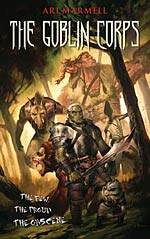 The Goblin Corps
The Goblin Corps
Ari Marmell
Morthul, the dreaded Charnel King, has failed.
Centuries of plotting from the heart of the Iron Keep, deep within the dark lands of Kirol Syrreth—all for naught. Foiled at the last by the bumbling efforts of a laughable band of so-called heroes, brainless and over-muscled cretins without sense enough to recognize a hopeless cause when they take it on. Machinations developed over generations, schemes intended to deliver the world into the Dark Lord’s hands, now devastated beyond salvation. But the so-called forces of Light have paid for their meddling with the life of Princess Amalia, only child of the royal family of Shauntille.
Now, as winter solidifies its icy grip on the passes of the Brimstone Mountains, disturbing news has reached the court of Morthul. King Dororam, enraged by the murder of his only child—and accompanied by that same group of delusional upstart "heroes"—is assembling all the Allied Kingdoms, fielding an army unlike any seen before. The armies of Kirol Syrreth muster to meet the attack that is sure to come as soon as the snows have melted from the mountain paths, but their numbers are sorely depleted. Still, after uncounted centuries of survival, the Dark Lord isn’t about to go down without a fight, particularly in battle against a mortal! No, the Charnel King still has a few tricks up his putrid and tattered sleeves, and the only thing that can defeat him now…may just be the inhuman soldiers on whom he’s pinned his last hopes.
Welcome to the Goblin Corps. May the best man lose.
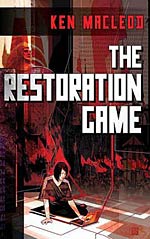 The Restoration Game
The Restoration Game
Ken MacLeod
There is no such place as Krassnia. Lucy Stone should know—she was born there. In that tiny, troubled region of the former Soviet Union, revolution is brewing. Its organizers need a safe place to meet, and where better than the virtual spaces of an online game? Lucy, who works for a start-up games company in Edinburgh, has a project that almost seems made for the job: a game inspired by The Krassniad, an epic folk tale concocted by Lucy’s mother, Amanda, who studied there in the 1980s. Lucy knows Amanda is a spook. She knows her great-grandmother Eugenie also visited the country in the 1930s and met the man who originally collected Krassnian folklore, and who perished in Stalin’s terror. As Lucy digs up details about her birthplace to slot into the game, she finds the open secrets of her family’s past, the darker secrets of Krassnia’s past—and hints about the crucial role she is destined to play in The Restoration Game…
Combining international intrigue with cutting-edge philosophical speculation, romance with adventure, and online gaming with real-life consequences, The Restoration Game delivers as science fiction and as a sharp take on our present world from the viewpoint of a complex, engaging heroine who has to fight her way through a maze of political and family manipulation to take control of her own life.
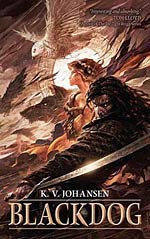 Blackdog
Blackdog
K. V. Johansen
Long ago, in the days of the first kings in the north, there were seven devils…
And long ago, in the days of the first kings in the north, the seven devils, who had deceived and possessed seven of the greatest wizards of the world, were defeated and bound with the help of the Old Great Gods…
And perhaps some of the devils are free in the world, and perhaps some are working to free themselves still…
In a land where gods walk on the hills and goddesses rise from river, lake, and spring, the caravan-guard Holla-Sayan, escaping the bloody conquest of a lakeside town, stops to help an abandoned child and a dying dog. The girl, though, is the incarnation of Attalissa, goddess of Lissavakail, and the dog a shape-changing guardian spirit whose origins have been forgotten. Possessed and nearly driven mad by the Blackdog, Holla-Sayan flees to the desert road, taking the powerless avatar with him.
Necromancy, treachery, massacres, rebellions, and gods dead or lost or mad follow hard on their heels. But it is Attalissa herself who may be the Blackdog’s—and Holla-Sayan’s—doom.
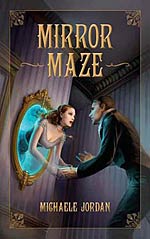 Mirror Maze
Mirror Maze
Michaele Jordan
Jacob Aldridge is still utterly devastated by the death of his fiance, when he suddenly encounters her doppelganger. Livia Aram’s uncanny resemblance to the late Rhoda Carothers so transcends coincidence that Jacob becomes obsessed with her. The intensity of his passion terrifies her until her compassion is roused by his desperate plight. A demon is stalking him, a succubus-like entity that feeds on human pain and desire. With the help of Jacob’s sister, Cecily, and Livia’s guardian, the mysterious Dr. Chang, they overcome the demon. Or so it appears…
Jacob, Livia, and Cecily are all victims of a single curse, a curse that entrapped and destroyed their parents before them. Now fate has drawn the unsuspecting descendants together, and the curse is playing out again. Nothing can help them, until Cecily’s husband returns from abroad. Colonel Beckford has been missing for years; he has seen strange things and acquired strange powers in his absence. Now he will do whatever it takes to free his wife and end the demon and its curse once and for all.
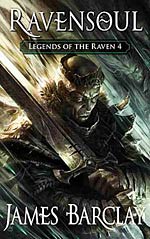 Ravensoul
Ravensoul
Legends of the Raven: Book 4
James Barclay
Death cannot separate them.
For those who believe that death is the end, an unbroken rest and peace, here is the wake-up call. For those who believed that the defeat of the demons had finally secured peace for Balaia, here is an enemy far more deadly, far more ruthless and far, far colder.
The Garonin: dimensional travelers seeking new worlds to rape of the element of magical power. Technologically advanced in weaponry and armor, and facing only swords and magic, they are destroying everything in their path.
Surely this is not a battle The Raven can win, even with allies both elven and dragon. But prevail they must, somehow. One thing we know for sure is that they will not subside meekly into the void.
For aficionados of The Raven, this is the ultimate challenge. It cuts to the very heart —from calls beyond the veil of death, to dissension in their ranks, to the greed of men who cannot see they are about to die, to betrayal by one they loved. But above it all, the heroism and selfless sacrifice displayed will bring tears to the eyes of even the most hardened fantasy reader.
This is The Raven, older, wiser, some returned from the grave. Grieving they seek nothing but rest from conflict, something the world will not grant them. But they remain The Raven, still answering when the call comes, still the force most likely to survive and bring the world with them, and still willing to die so that those they love can live.
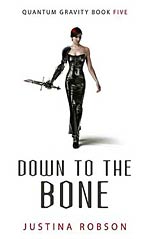 Down to the Bone
Down to the Bone
Quantum Gravity: Book 5
Justina Robson
Lila Black faces her greatest challenge yet as she takes herself, her dead lover, and the AI in her head into death’s realm…
Lila Black is now a shape-shifting machine plugged into the Signal—the total dataset of all events in the known universe and all potential events; Zal, the elf rock star with a demon soul, is now a shadow form animated and given material actualization by firelight; Teazle the demon has taken up the swords of Death and is on the way to becoming an angel. To say this puts some pressure on their three-way marriage is an understatement.
Meanwhile the human world is seeing an inexplicable influx of the returning dead, and they’re not the only ones. Many old evils are returning to haunt the living following three harbingers of destruction created in the ancient past.
What seems epic is revealed as personal to all concerned as events unfold and that which cannot be escaped must be faced. Heroic destinies unravel as greater powers reveal themselves the true masters of the game.
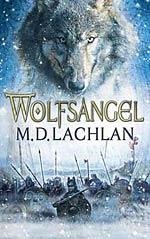 Wolfsangel
Wolfsangel
Wolfsangel Series: Book 1
M. D. Lachlan
The Viking king Authun leads his men on a raid against an Anglo-Saxon village. Men and women are killed indiscriminately, but Authun demands that no child be touched. He is acting on prophecy—a prophecy that tells him that the Saxons have stolen a child from the gods. If Authun, in turn, takes the child and raises him as an heir, the child will lead his people to glory.
But Authun discovers not one child, but twin baby boys. After ensuring that his faithful warriors, witnesses to what has happened, die during the raid, Authun takes the children and their mother home, back to the witches who live on the troll wall. And he places his destiny in their hands.
So begins a stunning multivolume fantasy epic that will take a werewolf from his beginnings as the heir to a brutal Viking king down through the ages. It is a journey that will see him hunt for his lost love through centuries and lives, and see the endless battle between the wolf, Odin, and Loki, the eternal trickster, spill over into countless bloody conflicts from our history and our lives.
This is the myth of the werewolf as it has never been told before and marks the beginning of an extraordinary new fantasy series.
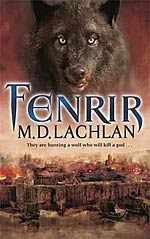 Fenrir
Fenrir
Wolfsangel Series: Book 2
M. D. Lachlan
The Vikings are laying siege to Paris. As the houses on the banks of the Seine burn, a debate rages in the Cathedral on the walled island of the city proper. The situation is hopeless. The Vikings want the Count’s sister, and in return they will spare the rest of the city. Can the Count really have ambitions to be Emperor of the Franks if he doesn’t do everything he can to save his people? Can he call himself a man if he doesn’t do everything he can to save his sister? His conscience demands one thing, the state demands another.
The Count and the church are relying on the living saint, the blind and crippled Jehan of St. Germain, to enlist the aid of God and resolve the situation for them. But the Vikings have their own gods. And outside their camp a terrifying brother and sister, priests of Odin, have their own agenda—an agenda of darkness and madness. And in the shadows a wolfman lurks.
M. D. Lachlan’s stunning epic of mad Gods, Vikings, and the myth of Fenrir, the wolf destined to kill Odin at Ragnarok, powers forward into new territories of bloody horror, unlikely heroism, dangerous religion, and breathtaking action.
Month of Horrors: In Praise of Unhappy Endings
Since this is my first post for Month of Horrors, I thought I might make it a comment on the worthiness of horror as a genre. I must confess that I have not read many of the books in the HWA Reading List, but I have long been a fan of Shirley Jackson’s short story, The Lottery. Initial reaction to the story was negative, sparking hundreds of angry letters and negative comments. One letter even came from her own mother, who declared: “this gloomy kind of story is all you young people think about these days.”
 To give too many details of Jackson’s classic story would be redundant. It is a very short story as it is. Suffice it to say, it’s about an annual stoning that takes places in a rural town in the 20th century. It’s classic horror, gloom and all. Like many examples of the genre, The Lottery takes ancient custom (in this case, human sacrifice) and juxtaposes it with a modern setting. The anachronism forces the reader to look at the brutality of our own past by making it more immediate. I selected the Lottery, not because it was the first (Poe and Lovecraft beat her to it by a century), but because it was (and is) the cleanest, simplest example of horror as a genre. It paints an everyday, almost welcoming picture of hometown USA, then cuts your throat and leaves you for dead. No wonder she had so much hate mail that summer!
To give too many details of Jackson’s classic story would be redundant. It is a very short story as it is. Suffice it to say, it’s about an annual stoning that takes places in a rural town in the 20th century. It’s classic horror, gloom and all. Like many examples of the genre, The Lottery takes ancient custom (in this case, human sacrifice) and juxtaposes it with a modern setting. The anachronism forces the reader to look at the brutality of our own past by making it more immediate. I selected the Lottery, not because it was the first (Poe and Lovecraft beat her to it by a century), but because it was (and is) the cleanest, simplest example of horror as a genre. It paints an everyday, almost welcoming picture of hometown USA, then cuts your throat and leaves you for dead. No wonder she had so much hate mail that summer!
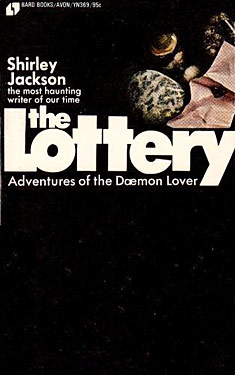 Look, I’m a sucker for a feel-good story, just like the next guy, but literature is at its best when it doesn’t give us what we want. Readers may yearn for happy endings, but we need unhappy ones. They are a call to action. Often, they are a challenge to stifling tradition. In Jackson’s world, “Although the villagers had forgotten the ritual and lost the original black box, they still remembered to use stones.” Their tradition is dead in all but practice, yet stubbornly, it remains. John Steinbeck once said “a writer who does not passionately believe in the perfectibility of man has no dedication nor any membership in literature.” Horror shows us the imperfect in man, and forces us to look. Without those terrifying glimpses in the mirror, we would never improve; never take that bold decision for change. This failure to change is, of course, at the heart of Jackson’s story:
Look, I’m a sucker for a feel-good story, just like the next guy, but literature is at its best when it doesn’t give us what we want. Readers may yearn for happy endings, but we need unhappy ones. They are a call to action. Often, they are a challenge to stifling tradition. In Jackson’s world, “Although the villagers had forgotten the ritual and lost the original black box, they still remembered to use stones.” Their tradition is dead in all but practice, yet stubbornly, it remains. John Steinbeck once said “a writer who does not passionately believe in the perfectibility of man has no dedication nor any membership in literature.” Horror shows us the imperfect in man, and forces us to look. Without those terrifying glimpses in the mirror, we would never improve; never take that bold decision for change. This failure to change is, of course, at the heart of Jackson’s story:
"They do say," Mr. Adams said to Old Man Warner, who stood next to him, "that over in the north village they’re talking of giving up the lottery."
Old Man Warner snorted, "Pack of crazy fools," he said. "Listening to the young folks, nothing’s good enough for them. Next thing you know, they’ll be wanting to go back to living in caves, nobody work any more, live that way for a while. Used to be a saying about ‘Lottery in June, corn be heavy soon.’ First thing you know, we’d all be eating stewed chickweed and acorns. There’s always been a lottery," he added petulantly. "Bad enough to see young Joe Summers up there joking with everybody."
"Some places have already quit lotteries," Mrs. Adams said.
"Nothing but trouble in that," Old Man Warner said stoutly. "Pack of young fools."
What Mr. Adams points out in disgust actually gives the reader some tenuous thread of hope: that the young will rise up and challenge the town’s barely remembered tradition. At its best, horror makes us all young, and challenges us to tear down the unexamined impulses that make us all guilty. The Lottery meets this standard and then some, more than justifying Shirley Jackson’s place in the WWEnd canon.
Automata 101: Robots and the Mechanical Age
Rhonda Knight is an Associate Professor of English at Coker College in Hartsville, SC. She teaches Medieval and Renaissance literature as well as composition courses. This blog will outline her experiences teaching an Honors English Composition course about created entities, beginning with the golem of Jewish legend and continuing through cyborgs, robots, androids, and artificial intelligence.
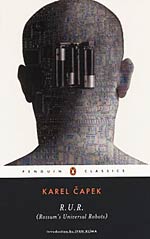 This section focuses on two texts and a film: Karel Capek’s play R.U.R. (Rossum’s Universal Robots), Fritz Lang’s Metropolis, and Isaac Asimov’s collection of short stories and essays Robot Visions. I chose the latter instead of the more popular I, Robot for two reasons. First, the number of stories plus their mixture with essays gave me a great choice of texts. The essays provided the students with some background and analytical exploration of robots. The second reason is the collection contained the novelette The Bicentennial Man, which I wanted to teach to provide a longer example of Asimov’s work. The students were excited to get to robots, the shiny humanoid forms, after the automata of the previous section.
This section focuses on two texts and a film: Karel Capek’s play R.U.R. (Rossum’s Universal Robots), Fritz Lang’s Metropolis, and Isaac Asimov’s collection of short stories and essays Robot Visions. I chose the latter instead of the more popular I, Robot for two reasons. First, the number of stories plus their mixture with essays gave me a great choice of texts. The essays provided the students with some background and analytical exploration of robots. The second reason is the collection contained the novelette The Bicentennial Man, which I wanted to teach to provide a longer example of Asimov’s work. The students were excited to get to robots, the shiny humanoid forms, after the automata of the previous section.
We began with Capek’s play, which gave the world the word “robot,” which is the Czech word for “serf.” Capek’s dystopic play, performed and published in 1921, is very concerned with the rights of the worker. It appeared in a time and a place where communism, socialism and capitalism were beginning to clash. The play enjoyed international success, debuting on Broadway in 1922 and in the West End in 1923. By the time it was performed in London, the play had been translated into thirty languages and performed in many other cities.
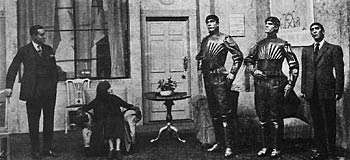 While the students’ expectations of CP3O-like robots were not exactly met, they were not disappointed. They learned that these “original” robots of R.U.R. were not mechanical at all but were instead organic in composition. However, this fact does not matter too much because the mechanical mode of production Capek describes puts one in mind of Henry Ford’s assembly line with robots working to produce more robots ad nauseum. We talked a lot about Capek’s world and why a world freed from work might be appealing, especially when many workers of the time felt as if they were dehumanized and only a part of the machinery of capitalism.
While the students’ expectations of CP3O-like robots were not exactly met, they were not disappointed. They learned that these “original” robots of R.U.R. were not mechanical at all but were instead organic in composition. However, this fact does not matter too much because the mechanical mode of production Capek describes puts one in mind of Henry Ford’s assembly line with robots working to produce more robots ad nauseum. We talked a lot about Capek’s world and why a world freed from work might be appealing, especially when many workers of the time felt as if they were dehumanized and only a part of the machinery of capitalism.
I structured the class so that the students read the Prologue and Act 1 for a Monday, on Wednesday we watched excerpts of Metropolis in class, and then we finished the play on Friday. Showing them Metropolis really helped them visualize how Capek thought about labor. The class is only 50 minutes, so I had to choose sections of the movie carefully. We focused on the first few minutes that juxtapose the workers at shift change with the rich boy Freder in the Eternal Gardens. The second section we watched was the explosion of the M-Machine in the factory, and finally we watched Maria’s transformation into the “machine-man.” Some of these moments are in this restoration trailer. (The students did finally get their shiny robot.)
 We concluded our discussion of R.U.R., focusing on the character of Helena, who through her desire to be a do-gooder, dooms mankind to extinction. Many of them noticed that Helena represented the upper class who wanted to improve the world but did not know the price of a loaf of bread. She has the charm of her namesake, Helen of Troy, and uses it to convince Dr. Gall to give the robots souls. This change created a new race of robots, who suddenly cared that they were working for beings who were weaker and dumber than they were. This caused the worldwide revolt and slaughter of all of humanity, except for one man who could build any more robots because Helena had destroyed the formula as a last-ditch effort to remedy her mistakes.
We concluded our discussion of R.U.R., focusing on the character of Helena, who through her desire to be a do-gooder, dooms mankind to extinction. Many of them noticed that Helena represented the upper class who wanted to improve the world but did not know the price of a loaf of bread. She has the charm of her namesake, Helen of Troy, and uses it to convince Dr. Gall to give the robots souls. This change created a new race of robots, who suddenly cared that they were working for beings who were weaker and dumber than they were. This caused the worldwide revolt and slaughter of all of humanity, except for one man who could build any more robots because Helena had destroyed the formula as a last-ditch effort to remedy her mistakes.
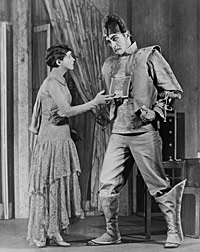 The ending of the play is ambiguous but points toward a super-evolved robot couple, Primus and Helena (named after the character), repopulating the earth the old-fashioned way. The Robot Helena is a commentary on her namesake. Dr. Gall remarks: “She is as lovely and foolish as the spring. Simply good for nothing.” Unlike the sterile human Helena, she developed the ability to procreate and with Primus (whose name means “first”) becomes, the new Adam and Eve.
The ending of the play is ambiguous but points toward a super-evolved robot couple, Primus and Helena (named after the character), repopulating the earth the old-fashioned way. The Robot Helena is a commentary on her namesake. Dr. Gall remarks: “She is as lovely and foolish as the spring. Simply good for nothing.” Unlike the sterile human Helena, she developed the ability to procreate and with Primus (whose name means “first”) becomes, the new Adam and Eve.
We noticed that Capek, like Mary Shelley, was not interested in the science of robot creation; Isaac Asimov, however, adds the concept of the positron brain and his three laws to bring in some science. I tried to choose stories that demonstrated Asimov’s exploration of his robots’ humanity, such as “Robbie,” “Evidence,” and “Robot Vision.” (Personally, I prefer the puzzle stories that demonstrate robots acting strangely because the laws are in conflict or a human gives a confusing order, such as “Runaround” or “Little Lost Robot.”) 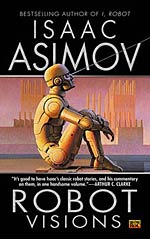 We also read essays in which Asimov explored why humanity would make robots in a human shape (“The Friends We Make”) and what mankind would do if robots replaced it as workers (“Whatever You Wish”). The second one provided an interesting counterpoint to R.U.R.
We also read essays in which Asimov explored why humanity would make robots in a human shape (“The Friends We Make”) and what mankind would do if robots replaced it as workers (“Whatever You Wish”). The second one provided an interesting counterpoint to R.U.R.
The students wrote papers that connected the ideas emerging in this section back to earlier ones. Some explored two reasons that humans fear robots in Asimov’s stories and Capek’s play. Others tried to define Asimov’s term “Frankenstein Complex,” which he never really defines, and to investigate its implications. I asked them to argue if Asimov’s use of the term seems to perpetuate or combat the Frankenstein Complex. Only one student chose the creative option to write a dialog between Capek and Asimov discussing robots, humans and work. All of these themes will transition us nicely to the next section which contains Marge Piercy’s He, She and It and Philip K. Dick’s Do Androids Dream of Electric Sheep?
Month of Horrors: The Shadow Over Innsmouth
This is the first installment of our October series featuring Horror novels and stories. Rico and I will be blogging about some of our favorite scary books until the end of the month, even as we laboriously add new Horror-genre titles to the database. On Halloween, we intend to offer some general thoughts on the Horror genre, and why it’s an important addition to the WWEnd site.
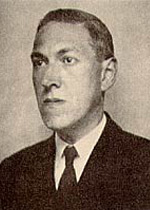 H.P. Lovecraft is a devisive but unambiguously influencial figure in the development of the Horror genre as we know it today. Writing what at the time was called “weird fiction,” Lovecraft drowned the genre in a sea of purple, a sea that had strange and tentacled monsters living in its depths. His stories have maintained an influence far out of proportion to his actual skill as a writer, as even his staunchest fans will admit. Something of an anachronism even in his own time (1890-1937), for the modern reader he exudes an air smelling of the worst of a disintegrated aristocracy, while ironically eschewing all aristocratic literary standards in favor of the quality of prose one would most likely find on a fan fiction message board. And yet… and yet, his vision of a universe gone mad, of gods even more malevolent than Kali or Typhoeus, of terrors lurking in the ocean’s depths, have made an impression entirely out of proportion to the man’s literary skill.
H.P. Lovecraft is a devisive but unambiguously influencial figure in the development of the Horror genre as we know it today. Writing what at the time was called “weird fiction,” Lovecraft drowned the genre in a sea of purple, a sea that had strange and tentacled monsters living in its depths. His stories have maintained an influence far out of proportion to his actual skill as a writer, as even his staunchest fans will admit. Something of an anachronism even in his own time (1890-1937), for the modern reader he exudes an air smelling of the worst of a disintegrated aristocracy, while ironically eschewing all aristocratic literary standards in favor of the quality of prose one would most likely find on a fan fiction message board. And yet… and yet, his vision of a universe gone mad, of gods even more malevolent than Kali or Typhoeus, of terrors lurking in the ocean’s depths, have made an impression entirely out of proportion to the man’s literary skill.
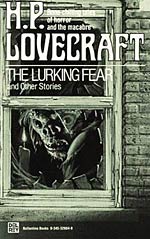 One of his most famous stories—and one of my personal favorites—is The Shadow Over Innsmouth, a novella that can be found in many volumes of his collected works (including The Lurking Fear and The Dunwich Horror and Others). Innsmouth serves almost as a Lovecraftian monomyth, containing his most popular tropes and plot elements in one place. Here we see the story of an ordinary man pulled gradually into an increasingly strange and terrifying revelation. Here we see the touch of madness that comes from a vision of something that ought not to be. Here we see even a hint of the Cthulu mythos that has spawned a school of imitators as numerous as the fish of the deep.
One of his most famous stories—and one of my personal favorites—is The Shadow Over Innsmouth, a novella that can be found in many volumes of his collected works (including The Lurking Fear and The Dunwich Horror and Others). Innsmouth serves almost as a Lovecraftian monomyth, containing his most popular tropes and plot elements in one place. Here we see the story of an ordinary man pulled gradually into an increasingly strange and terrifying revelation. Here we see the touch of madness that comes from a vision of something that ought not to be. Here we see even a hint of the Cthulu mythos that has spawned a school of imitators as numerous as the fish of the deep.
The narrator comes across Innsmouth almost by chance as a young man during his “coming of age” tour of New England. He is both repelled and attracted by the odd stories he hears about the town, stories of pagan cults, pirate jewels, human deformity, and an unusual abundance of fish. He decides to take the bus to Innsmouth only for a day to sate his curiosity, for he has been warned against staying the night. But, as these things often go, when he is set to leave in the evening he is told that the bus has had mechanical problems and won’t be ready for driving until the morning. Left without a choice, he does what he must to survive through the night.
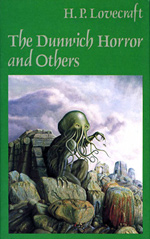 I’ll end with a brief sample of Lovecraft’s prose, also from Innsmouth. His language is colorful, but tends towards the higher end of the spectrum.
I’ll end with a brief sample of Lovecraft’s prose, also from Innsmouth. His language is colorful, but tends towards the higher end of the spectrum.
It was the end, for whatever remains to me of life on the surface of this earth, of every vestige of mental peace and confidence in the integrity of Nature and of the human mind. Nothing that I could have imagined—nothing, even, that I could have gathered had I credited old Zadok’s crazy tale in the most literal way—would be in any way comparable to the daemoniac, blasphemous reality that I saw—or believe I saw. I have tried to hint what it was in order to postpone the horror of writing it down baldly. Can it be possible that this planet has actually spawned such things; that human eyes have truly seen, as objective flesh, what man has hitherto known only in febrile phantasy and tenuous legend?
Until next time, Iä-R’lyeh! Cthulhu fhtagn!



















 Full Details
Full Details

